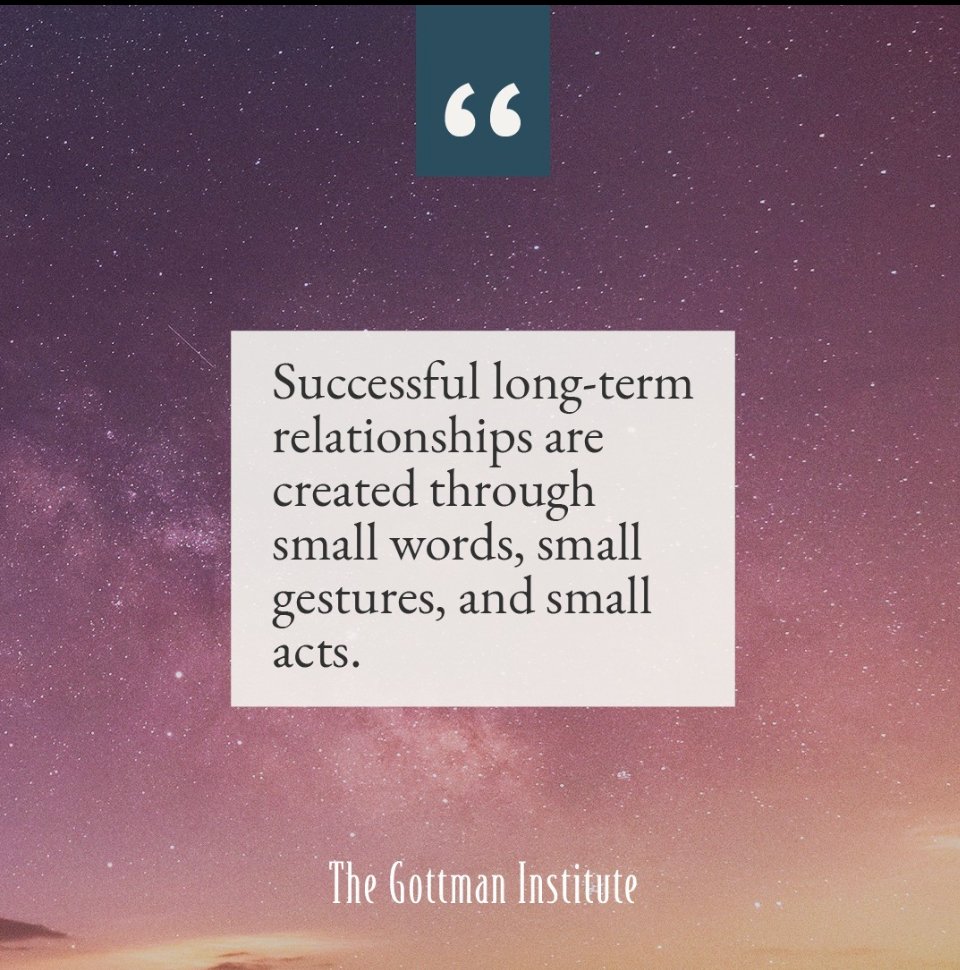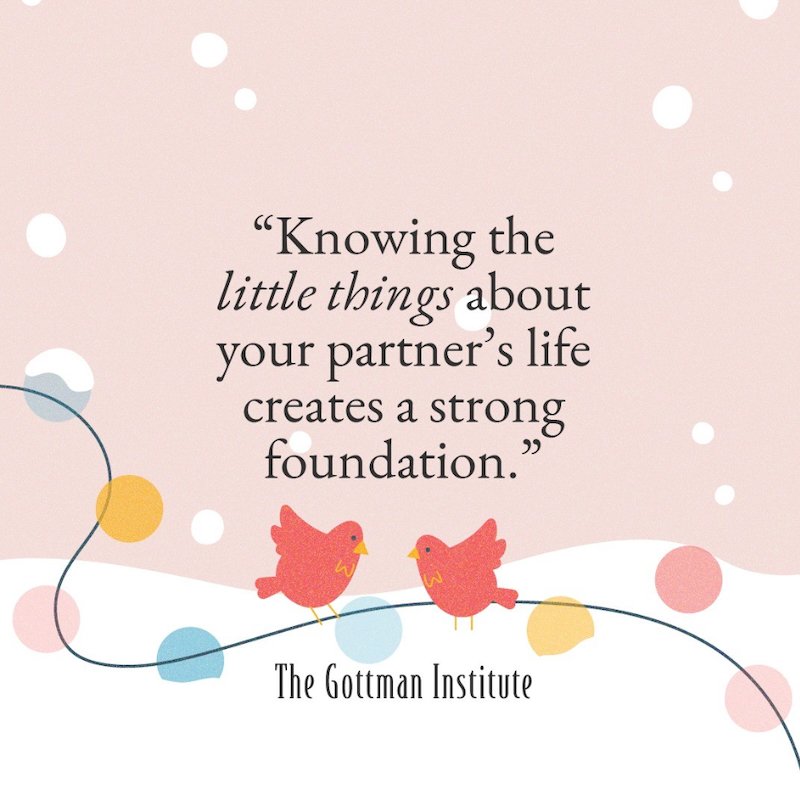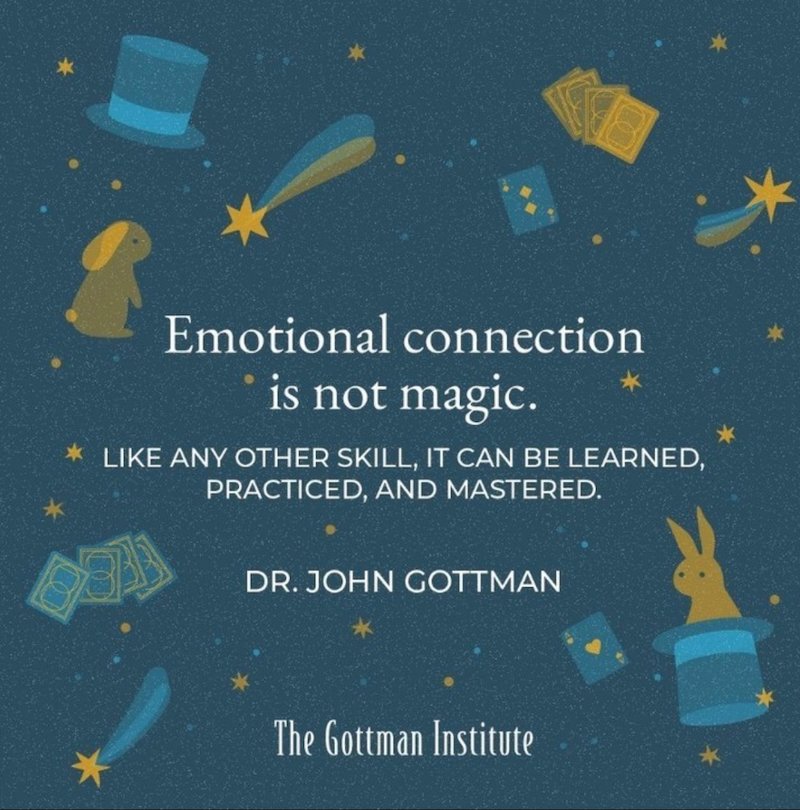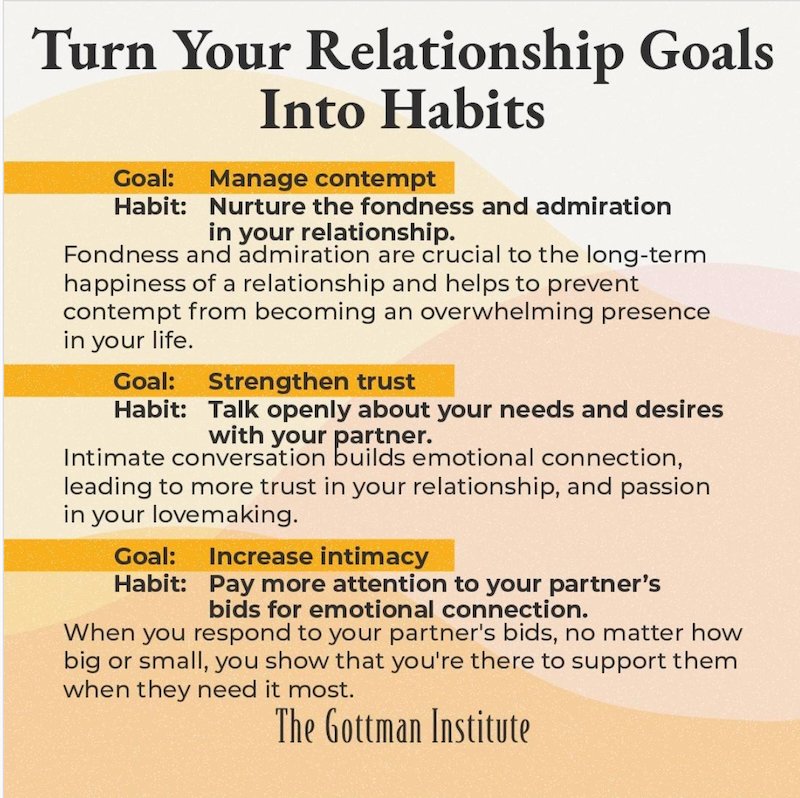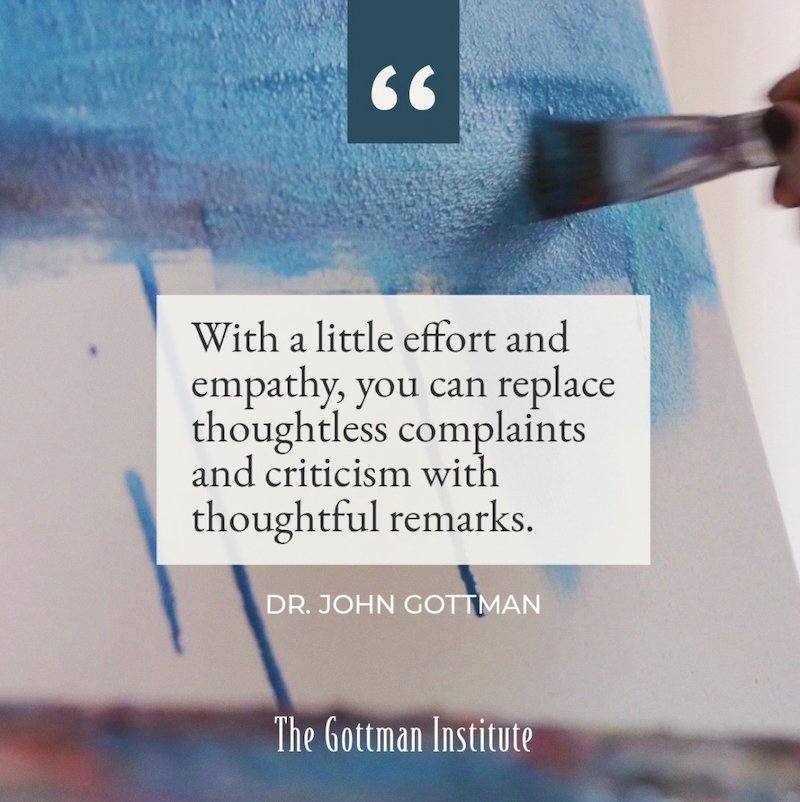These 5 Habits Could Save Your Relationship
by Carolyn Firestone
The internet is flooded with relationship advice. Some good. Some bad. A lot of it incredibly simplistic. Or deeply theoretical.
Or just not very easy to implement in our actual day-to-day lives.
Which is why when we recently came across a very “doable” idea from The Gottman Institute, an organization that’s spent decades studying romantic relationships, we were intrigued. Here’s what it is:
Instead of thinking big picture and focusing on large sweeping changes, couples should work on building small, specific, and attainable “habits.”
Image from @GottmanInstitute/ Instagram
So, rather than speak in platitudes or bombard you with okay (but unhelpful) advice like “treat your partner the way you want to be treated,” “know your past to shape your future,” or “stop keeping score in your relationship,” we asked Gottman Certified Therapist and bestselling author of, most recently, Love Is an Action Verb, Laura Silverstein, LCSW to break things down into actionable advice for couples.
“The fastest and easiest way to reach your relationship goals is to turn them into bite-sized habits that you can implement every single day,” said Silverstein. “Happy couples make a practice of inserting small moments of positivity into their relationship on a regular basis instead of feeling overwhelmed by trying to make changes in their personalities, values, or beliefs.”
She told us which habits can create a powerful ripple effect in our relationships and how we can get better at practicing them.
But first, here’s how to get yourself in the best mindset for changing your habits:
1. Think about it as adding a new habit rather than fixing an old pattern.
“We know from motivational psychology that people respond better to being encouraged to do something positive versus to stop doing something negative,” said Silverstein. “Most people feel the desire to succeed when they see a clear, easy path to improvement. Criticism, on the other hand, often leads to defensiveness and discouragement.”
2. Keep in mind that these habits are the antidote to “Roommate Syndrome.”
A lot of dissatisfaction arises when couples “feel like companions or co-workers tackling to-do lists together instead of close intimate partners,” said Silverstein. Adding little “connection habits” into their daily routine can spark more personal feelings of being seen or significant. This can include something as simple as sending a mid-morning text that mentions specifics about the other person’s separate day or having a five-minute conversation discussing any interesting or stressful events that came up for them.
3. Keep it short and sweet.
For the most part, this strategy actually works best when you choose a ritual that “doesn’t take so much time and energy that you cannot sustain it long-term. Consistency will be easier when you commit to activities that take five minutes or less,” said Silverstein.
4. Expect things to get harder in heated moments.
Obviously, all tips or habits are easier to sustain when things are going smoothly. “The place most couples fall out of routine is when they are annoyed at each other,” said Silverstein. “It might be hard to authentically thank your partner for making an amazing dinner when there’s tension around something they did (or forgot to do) yesterday.”
When tensions arise, you can notice that you’re flooded. Take a walk. Seek out whatever works for you to get a little calmer. But then, still try to bring some lightness to your interaction with your partner. “It’s kind of like continuing your running routine when it’s raining out,” said Silverstein. “If you can offer your partner warmth and tenderness even when they’re being a knucklehead, this is your ticket to combatting Roommate Syndrome.”
With these things in mind, here are the specific habits to try out in your relationship:
DAILY (Choose one to start with):
1. “Pause for a solid moment to connect before starting your hectic day. This can be a mini-makeout session by the front door, a lingering hug, or a sleepy forehead kiss when one of you is still in bed.”
2. “Send a text in the middle of the day that is flirty, appreciative, or encouraging. These should be void of reminders or logistical requests, keep those separate.”
3. “Ask each other one or two open-ended questions about how you feel, what is stressing you out, or what has your attention or interest lately.”
WEEKLY
4. “Set aside time for a 20-minute weekly check-in. Turn off all devices. This conversation is an opportunity to talk about how you actually are as well as to see if there are any differences that need to be discussed or difficult joint decisions to make. By blocking out time for this discussion, it is less likely to come out sideways in the form of a fight in the middle of tending to other obligations.”
MONTHLY
5. “Schedule date nights. Get in the habit of deciding what you want to do together and working as a team to set up all the logistics to make for a smooth, fun night.”
Simple as it may sound to add something like sending a considerate midday text, Gottman’s research has shown that little habits like these generate a certain energy and a fresh attitude between a couple that connects them to their interest and attraction.
So, how do these habits help couples?
1. They make each person feel seen and appreciated.
“Many couples clash when it comes to the division of labor regarding household tasks,” said Silverstein. “Often both members of the couple feel they are doing more and believe that their partner doesn’t see how hard they are working or how much they do.”
A lot of that gets diffused when people are actually acknowledging each other in small ways. “Each person is likely to feel more appreciated when they receive a text saying, 'Thanks for cleaning the kitchen while I was sleeping, the counters were glistening,’” said Silverstein. “And if someone is beginning to feel resentment regarding a chore that is getting dropped, they can bring it up during the 20-minute check-in instead of expressing it through irritability or, worse, passive-aggression.”
2. They keep you feeling the interest of your partner.
Another common clash between couples occurs around one partner feeling rejected or insecure about the other person losing interest or pulling away. This is where making a habit of being affectionate can be helpful.
And we know, routine is often pegged as a killer of intimacy. But reminding ourselves to do little things we actually enjoy, like giving our partner a 6-second kiss, is a way to reinforce that they’re “a romantic partner, not a platonic friend,” said Silverstein. “By inserting the tender affection of these rituals, you are reminding each other, 'You are my person. Our relationship is special, and we are a team.’”
3. They make your partner a priority.
Think of all the checkbox items we’re willing to do to make our careers and households run smoothly. So why not add a few surrounding our romantic lives?
“Emotional disconnection occurs when couples' relationships move to the back burner. It is rarely anyone’s intention to make their partner feel de-prioritized, but it can happen when other responsibilities compete for time and attention,” said Silverstein. “When each of you commits to the five seconds it takes to send a heart emoji or kind word every single day, you have something concrete to counter-balance any negative self-talk that might lead you to doubt your partner’s feelings for you.”
4. They help diminish the negative patterns you might otherwise fall into.
It’s obviously not possible to avoid conflict or negativity in any relationship. But what positive habits do is incrementally build a more cushioned “foundation of warmth and generosity” to fall back on when things inevitably come up.
“You are then working to solve a joint problem with someone who likes you, thinks you're cute, and wants you to be happy,” said Silverstein. “This creates a dynamic where couples manage conflict as a team instead of fighting against each other as if they are enemies.”
carolyn firestone
Carolyn is a freelance writer and editor. Her favorite thing to do is to write about her favorite things, especially when they have even the slightest chance of making someone else’s something (mood, relationship, travel plans, or toiletry kit) a little better. You can find more of her articles here.
This article is for informational purposes only. It is not intended to be used in place of professional advice, medical treatment, or professional care in any way. This article is not intended to be and should not be a substitute for professional care, advice or treatment. Please consult with your physician or healthcare provider before changing any health regimen. This article is not intended to diagnose, treat, or prevent disease of any kind. Read our Terms & Conditions and Privacy Policy.


